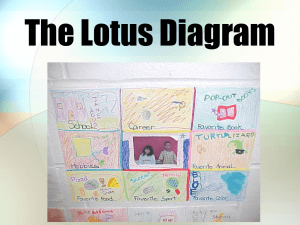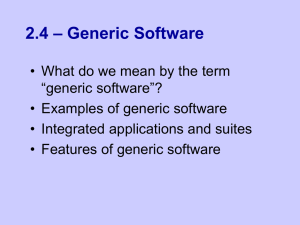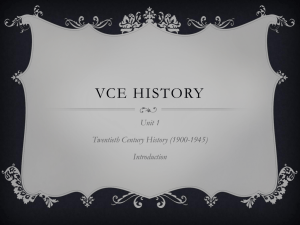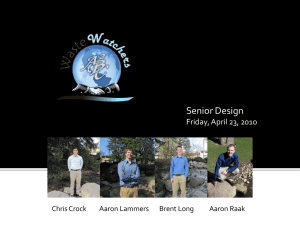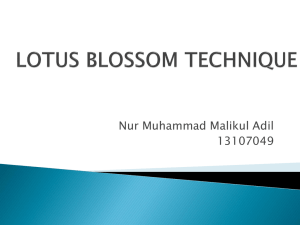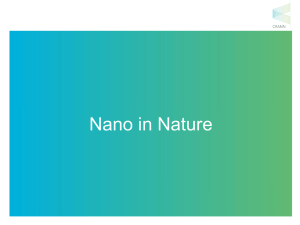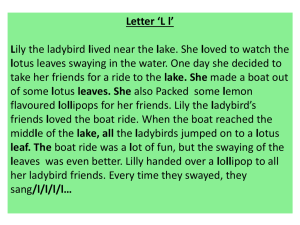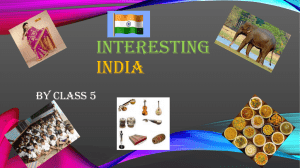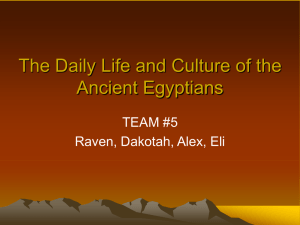a company profile
advertisement
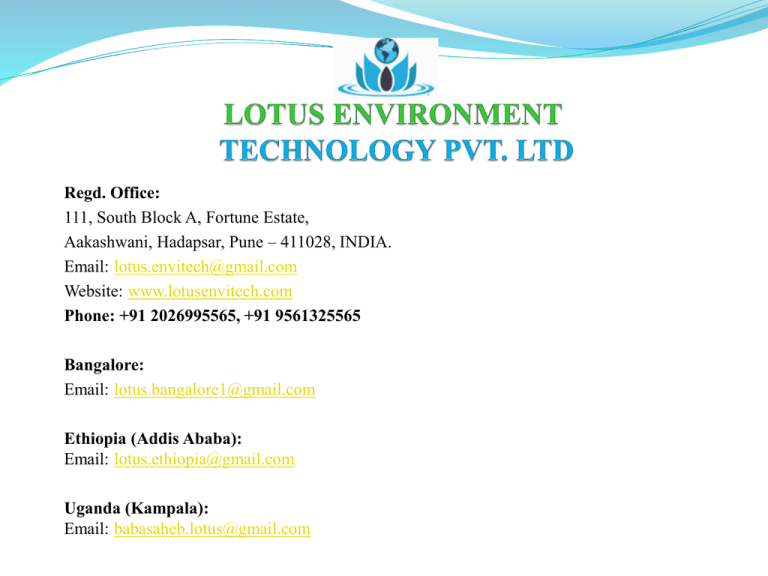
Regd. Office: 111, South Block A, Fortune Estate, Aakashwani, Hadapsar, Pune – 411028, INDIA. Email: lotus.envitech@gmail.com Website: www.lotusenvitech.com Phone: +91 2026995565, +91 9561325565 Bangalore: Email: lotus.bangalore1@gmail.com Ethiopia (Addis Ababa): Email: lotus.ethiopia@gmail.com Uganda (Kampala): Email: babasaheb.lotus@gmail.com About Company Lotus Environment Technology Private Limited (LETPL) is specialized company in the area of Water ,Waste Water & Solid Waste Management. We are involved in design, erect, install & commission STPs , ETPs & WTPs (conventional & RO) projects. We also do Troubleshooting, Commissioning, Operation, and Maintenance of STPs & ETPs using self developed Bioculture (Lotus Biotechnology). We have already commissioned and are operating plants from 50 KLD to 110 MLD using Lotus Biotechnology. Water Treatment Pretreatment Plants Filtration Plants (Sand & Carbon) Ultrafiltration/Microfiltration Plants Reverse Osmosis Plants Desalination Plants Water Softening Plants Demineralization Plants Haemodialysis Water Plants Boiler Water Treatment Plants Conventional Water Treatment Schemes for Villages & Panchayats (Small Towns). Sewage Treatment Plants (STPs) Lotopac STP Lotus LCST Process(Low Strength) Packaged STP MBBR or FAB STP Noiseless, Odorless & Underground STP (RCC & FRP) SBR (Sequencing Batch Reactor) STP MBR (Membrane Bioreactor) STP Anaerobic Filter STP UASB Reactor STP Effluent Treatment Plants (ETPs) Lotopac & Packaged ETP Lotus LCST Process(High Strength) Slaughter House (Abattoir) & Poultry ETP Sugar Mill ETP Food Processing ETP Dairy & Milk Processing ETP Distillery ETP Beverages & cold drinks ETP Pharmaceuticals ETP Effluent Specific Treatment Lotus LCST Process “Lotus LCST (Low cost Sewage Treatment)” a new technology introduced by Lotus Environment Technology Pvt Ltd (LETPL) considering less capital investment, less power requirement, low maintenance, less manpower requirement, low operating cost and most important is very good outlet quality of treated sewage. Lotus LCST Process is combination of pretreatment, biologically enhanced primary treatment and Biological Treatment (UASB) followed by degassing mechanism. This process is highly suitable for low strength wastewater especially domestic sewage. Lotus Biotechnology is main constituent responsible for degradation of organic matter (BOD & COD) Lotus LCST Process Type Lotus LCST Process “Rural” Lotus LCST Process “Urban/Municipal” Essential Components of Lotus LCST Process (Rural) 1) Pretreatment. Screening Grit, Oil & Grease removal Equalization 2) Biologically Enhanced Primary Treatment. Primary Tube Settling Tank (using Lotus Biotechnology) 3) Secondary (Biological) Treatment . Root Zone Technology 4) Sludge Treatment. Sludge Holding Tank, Sludge Dewatering Systems, Sludge Drying Beds Process Flow Diagram Lotus LCST Process (Rural) Equalization Tank with Pretreatment Inlet Sewage Primary Tube Settling Clarifier Lotus Biotechnology Sludge Drying Beds Treated Sewage to Disposal Treated Water Tank 75 to 80% reduction 20 to 25% reduction Root Zone Bed Pretreatment 1) Screening: Removal of floatables like clothes pieces, plastic bags, pouches etc using manual or mechanically raked screens. 2) Grit, Oil & Grease removal: Removal of grit, sand, debris, fat, oil & grease using density differences of materials. FOG removed by skimmers & grit collected at bottom. 3) Equalization: Equalizes sewage flow as well as Physico-chemical & biological parameters like pH, BOD & COD. Biological Enhanced Primary Treatment Biologically Enhanced Primary Tube Settling Tank. Removal of BOD, COD & TSS using Lotus Biotechnology capable of removing 75 to 80% organic matter (BOD, TSS & COD) Raw Sewage from Equalization Tank Primary Clarified Water to Root Zone Bed Lotus Biotechnology 75 to 80 % reduction of organic load Primary Sludge to Sludge Handling System Secondary (Biological) Treatment Root Zone Technology Root Zone Treatment System are planted filter-beds consisting of sand/gravel/soil. It uses a natural way to effectively treat sewage. It removes 20 - 25% of organic load (BOD & COD). phytoremediation Phragmites australis Raw & Treated Sewage Quality Sr. Parameters No. Unit Raw After Lotus LCST Process - 6.5 - 8.5 6.9 - 7.2 6.9 - 7.2 After Tertiary 1 pH 2 Biochemical Oxygen Demand (BOD) mg/l 250 ≤ 30 ≤ 20 3 Chemical Oxygen Demand (COD) mg/l 400 ≤ 50 ≤ 30 4 Total Suspended Solids (TSS) mg/l 200 ≤ 25 ≤ 10 5 Oil & Grease mg/l 15 ≤5 ≤2 Essential Components of Lotus LCST Process (Urban/ Municipal) 1) Pretreatment. Screening Grit, Oil & Grease removal Equalization 2) Biologically Enhanced Primary Treatment. Primary Tube Settling Tank (using Lotus Biotechnology) 3) Secondary (Biological) Treatment . Up flow Anaerobic Sludge Blanket Reactor (UASB) with Polishing pond 4) Sludge Treatment. Sludge Holding Tank, Sludge Dewatering Systems, Sludge Drying Beds (for Urban) or Centrifuge (for Municipal). Process Flow Diagram Lotus LCST Process (Urban/Municipal) Biogas for use Inlet Sewage Equalization Tank with Pretreatment UASB BEPT Pump Lotus Biotechnology 75 to 80% reduction Pump Sludge Drying Beds Buffer Tank 20 to 25% reduction Degassing Mechanism Outlet Polishing Pond Pretreatment 1) Screening: Removal of floatables like clothes pieces, plastic bags, pouches etc using manual or mechanically raked screens. 2) Grit, Oil & Grease removal: Removal of grit, sand, debris, fat, oil & grease using density differences of materials. FOG removed by skimmers & grit collected at bottom. 3) Equalization: Equalizes sewage flow as well as Physico-chemical & biological parameters like pH, BOD & COD. Biologically Enhanced Primary Treatment Biologically Enhanced Primary Tube Settling Tank. Removal of BOD, COD & TSS using Lotus Biotechnology capable of removing 75 to 80% organic matter (BOD, TSS & COD) in PST. Raw Sewage from Equalization Tank Primary Clarified Water to Root Zone Bed Lotus Biotechnology 75 to 80 % reduction of organic load Primary Sludge to Sludge Handling System Secondary (Biological) Treatment UASB (Upflow Anaerobic Sludge Blanket Reactor) with Degassing mechanism UASB uses an anaerobic process whilst forming a blanket of granular sludge which suspends in the tank. Wastewater flows upwards through the blanket and is processed (degraded) by the anaerobic microorganism. It reduces organic load by 20 - 25%. Degassing Mechanism is removes dissolved gases present in the UASB outlet. It also increases dissolved oxygen in the UASB treated water. Raw & Treated Sewage Quality Sr. Parameters No. After PST After & UASB Tertiary PCB Norms Unit Raw - 6.5 - 8.5 6.9 - 7.2 6.9 - 7.2 6.5 - 9 1 pH 2 Biochemical Oxygen Demand (BOD) mg/l 250 ≤ 25 ≤ 20 ≤ 30 3 Chemical Oxygen Demand (COD) mg/l 400 ≤ 75 ≤ 30 ≤ 100 4 Total Suspended Solids (TSS) mg/l 200 ≤ 30 ≤ 10 ≤ 100 5 Oil & Grease mg/l 15 ≤2 ≤2 ≤ 10 Area and Power Requirement Plant Capacity Area Required for the Plant m2 Total Working Electrical Load (kWh) 1 MLD 217 177 5 MLD 850 720 10 MLD 1700 1800 Merits of Lotus LCST Process (Rural, Urban and Municipal) 1. Minimum installation cost & time. 2. Minimum electrical power requirement (only two pumps required). 3. Minimum maintenance. 4. Minimum operation cost (less manpower, Chemical, Lubrication cost). 5. Very good outlet quality. 6. Almost zero noise. 7. Removal of nitrogen & phosphorus poor (20 - 30%) in cold climate & better (50 – 60%) in tropics. Some Testimonials Pimpri Chinchwad Municipal Corporation Rahimatpur Municipal Council Greenland Agrotech Pvt Ltd Thank You
